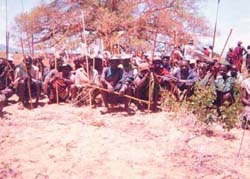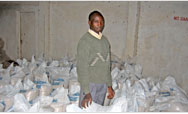
Photo: Sam Angolere
Junior-initiated elders listening to the Council of Senior Elders.
By identifying and training seventy-three community mobilizers in Karamoja, an important grassroots intelligence network was created to help maintain peace.
|
Initiative
USAID supported the Karamoja Initiative for Sustainable Peace (KISP) that emphasized developing personal contacts between influential elders within the different ethnic groups, and a permanent network of council elders and contact persons for useful, regular consultations within Karamoja.
This initiative identified and trained both women and young people as community mobilizers to encourage peace-building activities among their communities, and to gather information concerning raids and other aggressive activities. The aim was to encourage dialogue to prevent raids or to discuss the restitution of raided cattle. These individuals identify signs of potential raids and initiate dialogue to avert them. Radio programs, music galas, community meetings, mobilization campaigns, and traditional ceremonies were held to promote a culture of peaceful dispute resolution.
|


